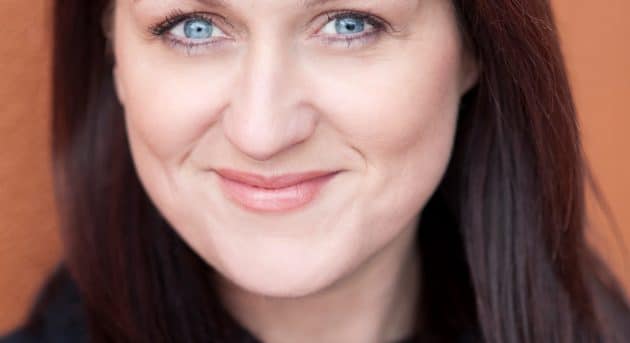Sally Bourne talks longevity in the industry
So often we can become preoccupied with becoming established in this industry, especially as fresh graduates; it can be hard to think beyond the first few years of your career. Longevity in this business, actually sustaining a career as a performer that lasts for more than 30 years, is often an incredibly difficult thing. But it can be done.
Since starring as Australia’s first Little Orphan Annie at the age of 12, Sally Bourne has spent 38 years continually working in the Australian arts industry and beyond. What makes Sally’s career so interesting is the variety of credits behind her, including a range of roles in London’s West End from My Fair Lady to A Christmas Carol, to originating a range of roles including Andrea in Jerry Springer the Opera at the Royal National Theatre to Brigitte Warne on her home shores in Shane Warne the Musical. On top of that, Sally is also the Co Chair for the Musical Theatre Panel of the Green Room Awards, as well as being a sought after singing teacher.
What her CV doesn’t show you is that Sally is one hell of a woman. Lovingly nicknamed ‘Biz Bourne’ by the Dogfight cast, Sally’s incredible wisdom, generosity and humour as a fellow cast member really compliments the fact that this actress knows her stuff. As such, I’m sharing my coffee this week with one such ‘Biz Bourne’, as we discuss the humanity of what we do, the difference in the Australian and British industry, and just how she’s managed to sustain the longevity in her career.
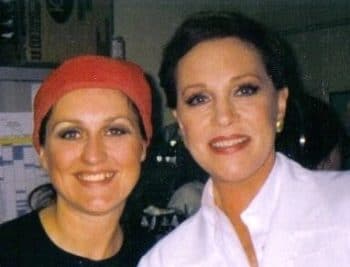
What keeps us going
After doing Les Miserables for a variety of tours over many countries, Sally is no stranger to long-running shows. And while there are many benefits of such long contracts, it can often be hard for an actor’s sanity doing the same show night after night. But it’s the subtle differences in each performance that keep it interesting for her and the audience.
“Even with playing Joanne (in Watch This’ Company) right now, I’ll do the scene and go, ‘oh god, how did I miss that?’ I think because my actor’s brain is constantly tweaking and finding and learning things. If you are invested in your role in every performance, the work is constantly evolving and it rarely gets boring. Also, there are other variables: people off, different audiences. And I really love it. There’s always some craziness backstage to keep it interesting too. I don’t remember ever thinking, ‘oh god, I’ve got to do the show.’”
“My Mum was a dancer and my Dad was an actor in musicals and on TV in Australia for over 50 years. When I did Annie, my Dad was really clear; he said, ‘you’ve got a job to do. It’s a job. Some people save lives, some people build houses; your job is this. And your job is to give respect to the audience every night.’ So even when I was knackered from doing Annie, I’d come out of the theatre and want to go home, but Dad said, ‘if there are people there who want to talk to you and get your autograph, you have to smile and be gracious. Your job is the storyteller and to keep the audience engaged, because people have paid for it.’”
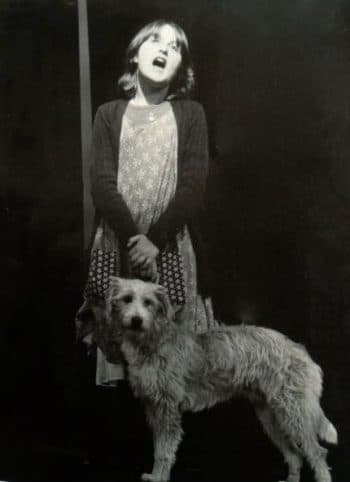
“I don’t mind people having a laugh on stage, all those I’ve worked with know how naughty I can be! Certain funny, clever things are bound to happen. But I’ve seen some people be real dicks on stage, and you go, ‘come on.’ Or actors thinking, ‘it’s a small audience, or it’s a Wednesday matinee or whatever’ and that’s not on. You always have to care that there’s an audience and they’ve paid money and they deserve a great show. Also, you never know who’s in. It could be someone’s uncle who’s over from America, who is a producer etc. Or even if it’s not about you and your career, every show is important.”
“I remember doing a gig in London once, and it was a late night thing where people could pay to have supper and be entertained post show by a West End performer, I really wasn’t in the mood and there were only about seven people there. I sang a song called Scarlet Ribbons. It’s a war song about a little girl who died and how she asked for scarlet ribbons and her mother went into the bedroom and the ribbons were on the bed. It’s the most beautiful, heart-breaking song. I did the gig, and I was a bit up myself, then I got this letter a week later from a woman saying, ‘my daughter passed away a month ago and I love that song and you made my night.’ And I felt so awful for taking the piss out of that gig because I was tired. That letter was a great kick up the arse. It’s pretty simple, but we should never discount our responsibility as storytellers. If you don’t care about your audience, you shouldn’t be doing it.”
London vs. Australia
After moving to London at the age of 25, Sally quickly joined the cast of My Fair Lady in the West End. Because she had become so established as ‘Australia’s Orphan Annie’, she found freedom in the lack of preconceived ideas about her over there. When asked about the differences in industries between here and London, she replies, “just the size.”
“Having said that, I haven’t been there for twelve years, and it has changed a lot. Wages there are pretty shocking. It can be a bit more of a ‘job job’ I guess, because some people stay in those shows, especially in London, for a long time. Pay off the mortgage. Especially because London’s a much more expensive place to live and to get on. But I wouldn’t take it back for the world.”
Creatively, Sally also explains a significant difference being “because the UK funds its arts.” While doing Jerry Springer: The Opera, Sally explains how the National Theatre paid for a 12 week rehearsal period after the show’s Edinburgh try-out, with all their best resources including “the best costume designers and makers and set builders.” Whereas in Australia, “people do write great things, but we sort of get it on at Chapel off Chapel for a week and that’s it. It’s not like someone grabs it and goes, ‘I’m gonna give you $50,000- let’s make it better!’ So you’ve got more opportunity there. Also, when I lived there especially, it was off the back of Les Miserables and people would fund anything. I’m not saying it’s easy, but there’s a little bit more freedom. It’s just a shame that Australia doesn’t have an infrastructure that supports, funds and works with our incredible talent. I am constantly in awe of all those small producers who keep putting on work here… I just wish they had more help.”
Originating a role
Especially in Australia where the opportunity is more rare, the chance to originate a role seems to be the dream for many actors. While working on Jerry Springer: The Opera, Sally describes days where she’d be workshopping a scene with the writers and be able to give her creative input, “and the next day I’d come in, and the lines would be changed.”
“I’ve got a card from Stewart Lee (the writer of Jerry Springer: The Opera) saying this show wouldn’t be what it is without your creative input. Not that I get points for it, but it’s a nice ego boost to actually be able to contribute to your character and your piece.”
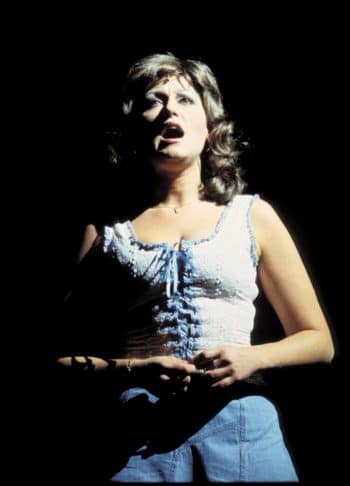
Even in playing such iconic roles as Company’s Joanne, Sally has often been asked whether she feels pressure regarding the many interpretations that came before her. But even with whatever has happened before you, Sally describes always needing to “bring something of you to the table, because that’s the whole point. You’re the only you.”
“The thing about the idea of McDonald’s theatre is that a cheeseburger tastes the same everywhere in the world, and that’s a hard thing to be able to creatively make it work for yourself. If you are doing an established show, it’s all plotted and it’s all done, of course, and that’s fine. And sometimes I guess that can be frustrating if that happens, but I just don’t remember feeling ever like I was a puppet. I think I’ve been really lucky actually. Then again, I think my parents just instilled a sense of, ‘you’re bloody lucky to be working’ in me. I did a few shows in London where people would whinge the whole time about the fact they didn’t have a bigger part and this or that. The basic thing is, you accept the job, so get on with it. I think it was just instilled in me to get on with it and enjoy it and make it work.”
The Secret to balancing family life and this industry
“Caffeine, sleep deprivation and determination.”
“I teach a lot more now than I used to. I left London and moved back when I was four months pregnant with my daughter. So I moved back here and had babies within two years. And because I was 38 and 40 when I had my kids, I made a very conscious decision that they were the most important thing. I’ve generally done quite small runs since, so my singing teaching, directing and cabaret writing make things a little easier. It is really hard with the kids, because in the olden days you’d get your Sunday and Mondays off. But now with the five show weekends, I just wouldn’t see my kids apart from Monday after school. They’re twelve and nine, and it’s too big a sacrifice to do such long runs. I mean, they’ll both hate me in four years when they’re teenagers and they’ll be off doing their own thing. But for now, I’m very happy with the variety in my career.”
“I also really love teaching. A lot of people don’t love teaching, but I find it incredibly fulfilling. I’ve even got one student who is 75, and she does it for the love of it, and we have a great time. Teaching is creatively incredibly fulfilling, because it’s so subjective. It’s about getting a good performance out of people, not just technically, but connecting and seeing. There are often a lot of tears when I teach people. Not just because I beat them into submission! But because we really share something. I love giving to my students and seeing them grow and find their voice. It’s a beautiful thing to be able to do, to teach people.”
Longevity in this business
“Versatility really helps. I think also for me, I worked in my twenties and thirties, but I was never the juvenile lead sort of look. I was never the pretty ingénue. When I turned 35, things just kept getting better and better. And now there are all these amazing roles. The idea of the triple threat is great, as long as it doesn’t negate the one threat that you have that’s really, really great. Being a pretty good singer, a pretty good dancer and a pretty good actor is great, but twenty years ago, you could be a phenomenal singer who could sort of dance a bit. I want to see the individual brilliance of a performer, not just someone who is pretty good at it all.”
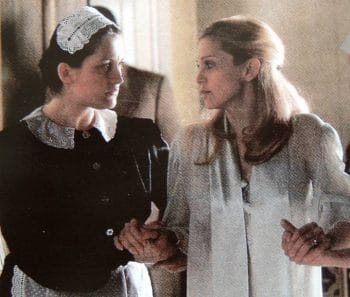
“It’s all about having that spark about you, and being able to do any genre. I think Amy (Lehpamer) is a really good example of that. We did Shane Warne: The Musical together. She’d be playing the violin in the wings wearing little to no clothing before running back on in a business suit. A very smart girl, and so versatile. She can play Janet in The Rocky Horror Show, Maria in The Sound of Music, and soon Dusty Springfield for The Production Company. That’s the mark of a true technician and artist.”
And while there may have been more frustrating moments in her career, Sally explains that, “in my wildest dreams, I don’t think I ever would’ve or could’ve thought, ‘this is all too hard.’ It’s just something I’ve always done. I’ve got pissed off with things, but I’ve never really thought, ‘I can’t do it anymore.’ Dad used to say the difference between a vocation and a career, is that a vocation is really something that comes from a passion and a heart and you’re compelled to do it. And I think that’s what this is. I guess I was just Bourne to do it.”

